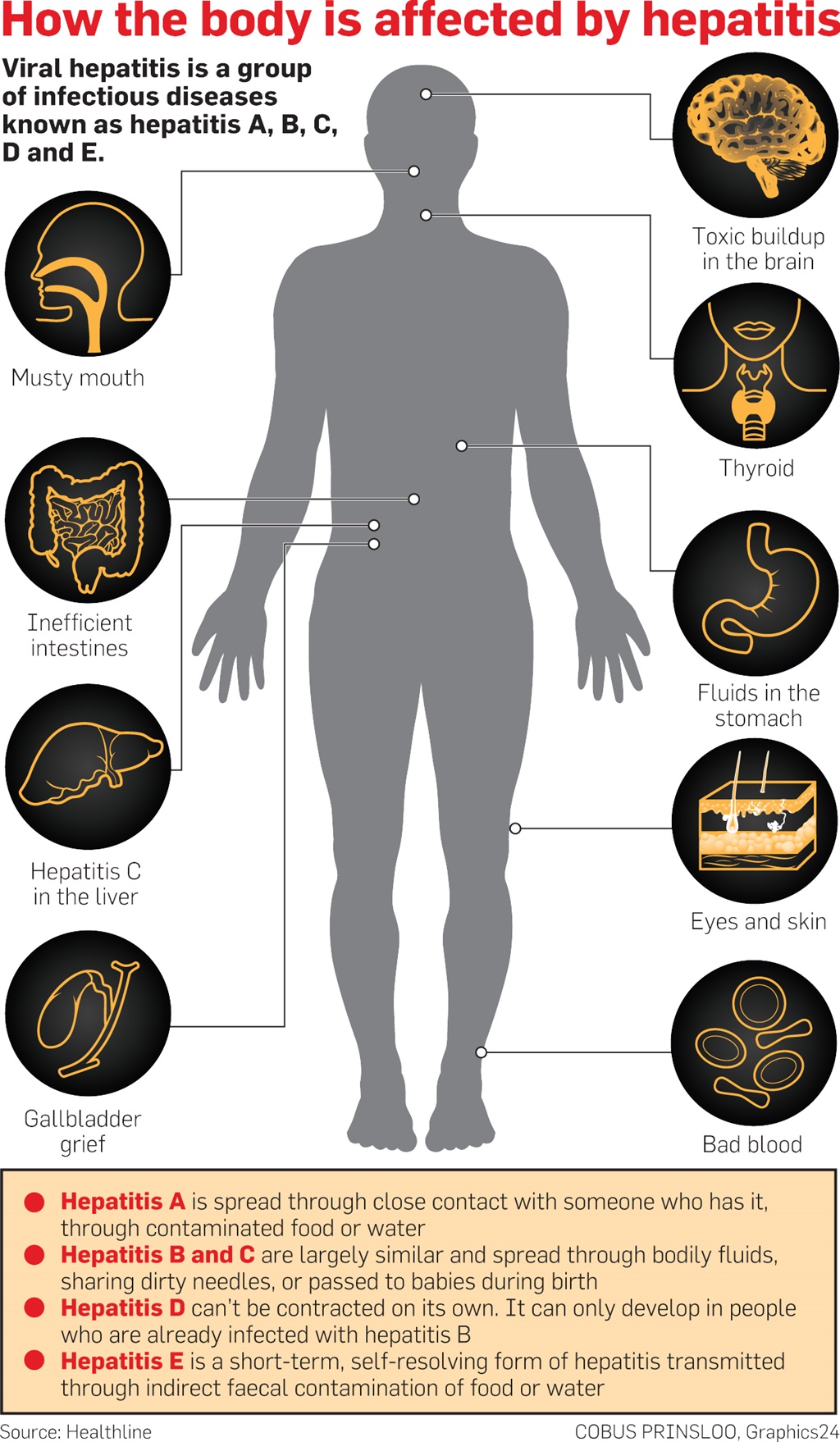
Deaths from viral hepatitis are on the rise across the world – and are now almost on par with those caused by tuberculosis and HIV.
The number of people who have succumbed to this disease increased by 63% between 1990 and 2013, according to a new study published in prestigious medical journal The Lancet.
The study showed that in 1990, 890 000 people died of hepatitis. Two decades later, the figure increased to 1.45 million.
It also showed that the annual fatality rate from viral hepatitis was now comparable with deaths resulting from tuberculosis (1.5 million in 2015), HIV (1.1 million in 2015) and malaria (438 000 in 2015), according to the World Health Organisation.
However, hepatitis is preventable.
Viral hepatitis comprises a group of infectious diseases: hepatitis A, B, C, D and E.
This affliction causes acute and chronic liver disease, and affects millions of people worldwide, including in South Africa.
Bernadette Campbell, the group nursing service manager at Clinix Health Group, said it was important for people to understand and recognise the symptoms of hepatitis to win the war against it.
“Hepatitis A is extremely contagious,” she warned.
People usually contract it through close contact with an infected person, or from food or drink prepared by an infected person, or by eating shellfish harvested from sewage-contaminated water. However, the disease often dissipates over time.
“Hepatitis B is spread through contact with the blood or body fluids of an infected person, or by sharing personal items or dirty needles with someone who is infected,” Campbell said.
“Women with hepatitis B can also pass it on to their babies at birth.”
According to the latest study, most deaths from hepatitis are caused by the B and C viruses, which lead to liver damage (cirrhosis) and liver cancer.
Adults infected with hepatitis B generally suffer from a short-term infection, but nine out of 10 babies born with it will have a long-term infection.
Hepatitis D causes liver inflammation. This swelling can impair liver function, resulting in long-term liver problems, including liver scarring and cancer.
Unlike the other forms, hepatitis D cannot be contracted on its own. It can only develop in people already infected with hepatitis B.
Hepatitis E is a short-term and self-resolving form of hepatitis. It is transmitted through indirect faecal contamination of food or water.
Symptoms of hepatitis include fatigue, jaundice (yellowing of the skin), nausea and, often, a loss of appetite. Children may have severe stomach pains and diarrhoea.
“However, some infected people do not have symptoms and may not know they have hepatitis until they develop serious complications. The good news is that there are vaccines for hepatitis that can be administered to babies and adults,” said Campbell.
“Hepatitis is also treatable once contracted.”
What can people do to prevent contracting hepatitis? The answer is simple: get vaccinated against hepatitis A and B, use condoms during sex, practise safe hygiene and avoid sharing needles or personal items such as toothbrushes, razors or nail scissors with an infected person.
All children should get their first dose of hepatitis B vaccine at birth and complete the vaccine series by six to 18 months of age.
The hepatitis A vaccine is administered at 12 months.
“Hepatitis vaccines are recommended for all babies, so they will be protected from this serious but preventable disease,” said Campbell.
“Babies and young children are at much greater risk of developing a chronic infection if infected, but the vaccine can prevent this.”
Catch-up vaccines are available for children and adolescents younger than 19, as well as for adults who did not receive the vaccine as babies.
“You will be more susceptible to contracting the disease under the following circumstances: if you are travelling to a country with a high rate of the disease; have a blood clotting disorder such as haemophilia; use drugs; or have sexual or household contact with someone who has this disease, as well as HIV or chronic liver or kidney disease,” cautioned Campbell.
“If you fall within this group, we strongly encourage you to contact your doctor or local hospital for advice on being vaccinated. It is up to each one of us to stop the spread of this disease.
“And remember: the sooner hepatitis is treated, the less damage there is to the liver. So, early detection and treatment are vital. If you suspect you may have hepatitis, contact your doctor immediately.”
Talk to us
Have you ever contracted or been treated for viral hepatitis?
SMS us on 35697 using the keyword VIRUS. Please include your name and province. SMSes cost R1.50




 Publications
Publications
 Partners
Partners























